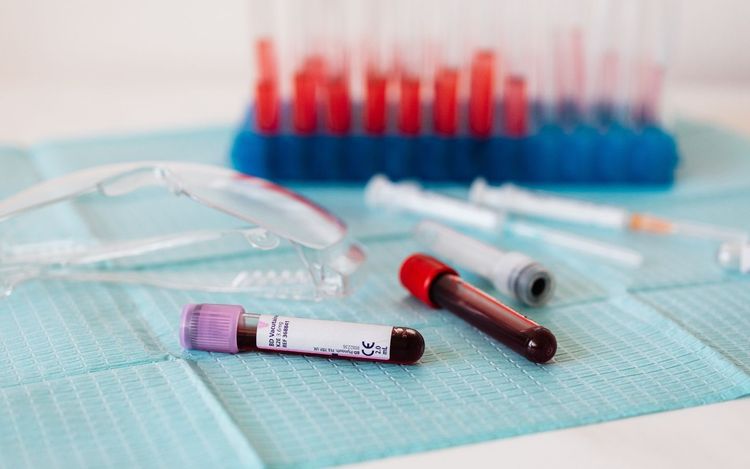Private Immune System Test
Because your health matters.
Our immune system is a complex network of organs, cells, and proteins that plays a vital role in defending the body against infection and protecting our body’s own cells from damage. As a result, the proper functioning of the immune system is key to overall health and wellbeing.
An immune system test is a valuable diagnostic tool that can identify how your body’s immune system is functioning. Low immune system tests can monitor your immune system to provide essential insights into your overall health and help identify if you need to take proactive steps to boost your immune health.
Our private immune system test is a quick, easy, and accurate way to check the functioning of your immune system. An immune system test is included in our Complete full body health MOT, but it can also be added as an extra test to many of our existing health packages to give you complete peace of mind.
Explore our packages and book online today.
USPs

1.
Fast, accurate results
2.
Competitively priced testing within 20 minutes of your home
3.
Detailed, personalised Results Report
4.
Access to our 24/7 GP service with all test packages
How it works

1. Select and book your package
View our health test packages and book a full body private health check. All our individual tests can be added to any of our private health check packages. . Just call our team on 0800 652 2183 before your appointment to add an extra test.
2. Make an appointment
Choose the venue, date and time that suits you. With over 2000 appointments available nationwide every week, you're sure to find a convenient time, date and venue.
3. Attend your appointment
A trained health assessment specialist will carry out your blood test. The whole process only takes around 20 - 30 minutes.
4. Fast, accurate results
Your results will be available 24/7 through our online dashboard, My Wellness. You will receive an email notification as soon as your results are ready for viewing. Processing times vary by test, with some results accessible on the dashboard in as little as three days. The online dashboard also provides easy access to a downloadable PDF, making it simple to share your results with your GP.
How to test immune system strength?
The best way to test your immune system strength is through blood tests. Blood tests for immune system health can provide vital insights into whether your body is reacting as it should to illness or infection.
The immune system is the body’s first line of defence against foreign bodies. It is designed to help protect you from getting sick and to promote healing if you do get unwell or injured.
The immune system comprises a large network of organs, white blood cells, proteins, and chemicals. These parts all work together to help protect your body from:
- Bacteria
- Viruses
- Parasites
- Cancer cells
- Fungi that cause infections
The immune system also plays a vital role in helping your body recover following an injury or illness.
When your immune system is functioning correctly it:
- Recognises the difference between your cells and those that are foreign
- Activates and mobilises to kill foreign bodies that may harm you
- Ends an attack once the threat is over
- Develops antibodies against foreign bodies you’ve had contact with
- Sends out antibodies to destroy germs that try to enter your body in the future
Your immune system does not always function correctly. Sometimes, it may be too weak to fight off infection, and sometimes, the response can be too strong and destroy cells your body needs. This can lead to problems, including allergic reactions or an autoimmune disease.
Weak immune system test
A weak immune system means that the response your immune system provides is too weak to fight off an invasion. A weakened immune system can be a result of many factors, including:
- Chronic stress
- Lack of sleep
- Poor diet
- Over-exercising
- Autoimmune disorders (when the body attacks and destroys its own cells by mistake)
- Chronic illnesses, like type 2 diabetes
- Lifestyle factors such as drinking too much alcohol, smoking, or living a sedentary life
While some of these factors can be mitigated by changing one's diet and lifestyle, others, like an autoimmune disease or a chronic illness, may require medical treatment or interventions.
Taking a weak immune system test can offer valuable insights into how your immune system is currently functioning and ensure you get any necessary treatment to ensure its normal function.
Why should you consider having an immune system test?
A private immune system test is ideal for anyone who wants to learn more about their overall health.
It is normal to develop a few infections each year, like the common cold, a stomach bug, or flu. However, repeated bouts of illness or infection could indicate a weak immune system. If you repeatedly suffer from any of the below, blood tests for immune system health may be recommended:
- Recurrent infections or illnesses
- Persistent fatigue
- Autoimmune disorders
- Chronic illnesses
What does a private immune system test check for?
Our private immune system test assesses your white blood cells as they offer key insights into the functioning of your immune system.
White Blood Cells, also known as leukocytes, are cells that help the body fight infection and respond to inflammation. When the body encounters a foreign virus or bacteria, your white blood cells recognise it and destroy it before it can do any harm.
As part of an immune system blood test, you will receive a breakdown of the following types of white blood cells in your blood sample:
- Neutrophils – the most abundant type of white blood cells in your body that work primarily to help defend your body against bacterial infections.
- Lymphocytes – cells that help make antibodies and destroy some cancer cells.
- Monocytes – are a type of cell that can develop into two different cells; dendritic and macrophages, depending on what your body needs. - - Dendritic cells help to identify antigens, any substances that cause your immune system to produce antibodies, and macrophages which surround and kill microorganisms, remove dead cells, and stimulate the action of other immune system cells.
- Eosinophils – help to consume harmful matter and fight bacteria and combat parasitic infections.
- Basophils – are mainly responsible for the inflammatory reaction in your body’s immune response. Basophils are the least common type of white blood cells.
What does an immune system test involve?
Testing your immune system strength involves a simple blood draw. One of our trained health assessment specialists will collect a small sample of blood from a vein in your arm. This sample is then sent to a laboratory for analysis. The laboratory will measure the different types of white blood cells in your blood sample to provide insights into the functioning and strength of your immune system.
Results are usually available within a few days, and your Results Report will interpret the results and suggest any necessary follow-up actions.
Private health assessments for complete peace of mind
Our full body private health checks are perfect for busy people who want to take a proactive approach to monitoring their health and wellbeing. Our tests are quick, accurate, convenient and completely stress-free. There is no waiting for an appointment, safe clinical procedures, no embarrassing questions, no long travel times and no busy waiting rooms.
Our tests are conducted by trained health assessment specialists at over 350 venues across the UK and Ireland, ensuring accurate professional health checks within 20 minutes of your home.
Any individual tests can be added to any full body health check. Just book one of our full body private health assessments and call us before your appointment to add an extra test.
Need help? Call free on 0800 652 2183 to speak to one of our team.
FAQs
It is possible to check the functioning of your immune system by taking a small sample of blood and sending it off for analysis of key biomarkers related to immune function.
At Bluecrest Wellness, our private immune system test involves testing your white blood cells, neutrophils, lymphocytes, monocytes, eosinophils, and basophils. All of which can help provide comprehensive insights into the functioning of your immune system.
A private immune system test can be booked separately or added to one of our Full Body Health MOTs, to provide you with a comprehensive overview of your general health. With a full body MOT, in addition to a wide range of health tests, following your appointment, you'll receive a personalised Results Report and free 24/7 GP helpline access for an entire year.
Full preparation instructions will be provided in writing when you book an immune system blood test.
As some medications can affect your test results, you will need to inform us about any medicines or supplements you are currently taking. Please do not stop taking your medications unless directed to.
It is possible to test your immune system at home through a home testing kit. Although this may seem a practical option, it will not give you the most complete results. With Bluecrest Wellness, you can choose a test location close to home, making our private immune system test easily accessible and offering comprehensive results.
We run our affordable private health checks from high quality venues across the UK and Ireland. Simply find a location near you and book an appointment online today.
Your test results and other readings will each be given a ‘flag’ of a different colour: green, amber or red. Green results are within the recommended range for your age and sex; amber results are slightly outside what we'd normally expect; and red results are further outside the norm.
Where a result is amber or red, we'll give follow-up advice on what to do next - whether that's making lifestyle changes, simply monitoring the result, or visiting your doctor for further investigation.
If there are any critical results discovered by our laboratory, we will contact you immediately, so you won’t need to wait for your full Results Report to arrive to take appropriate action.
Your immune system test blood sample will be analysed by one of the leading laboratories in the UK. Once they have analysed your blood test sample, your test results are analysed and used to create your personalised Results Report.
